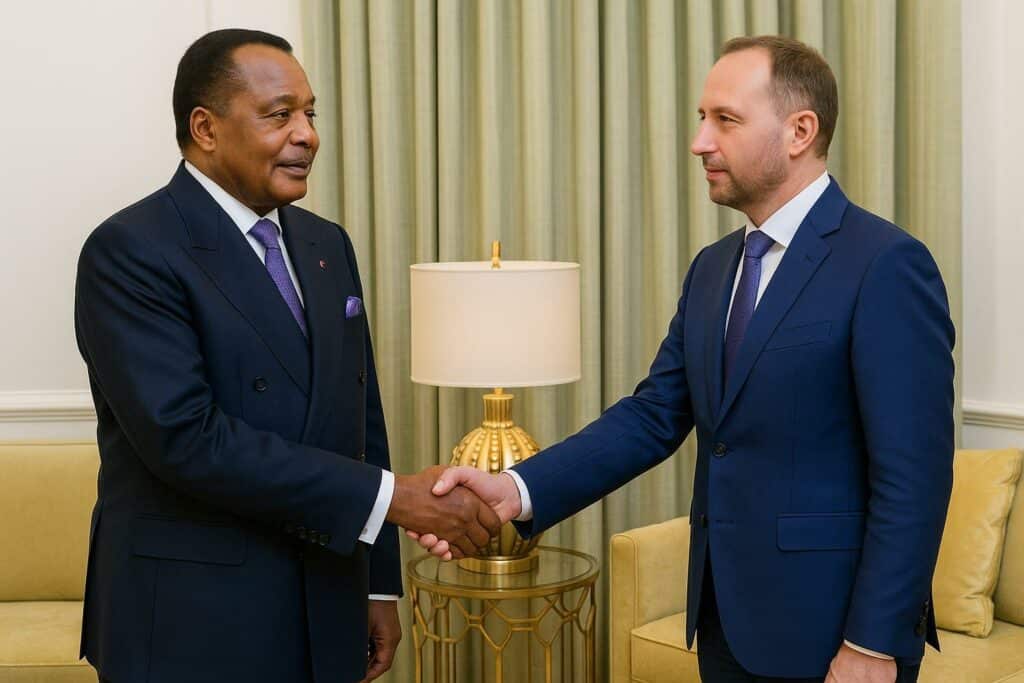Historic Bilateral Foundations Since 1961
Few African-European relationships have shown the quiet endurance of the Congo-Belgium axis. Formal ties, initiated in 1961, were soon underpinned by the 1983 General Agreement on Economic, Scientific and Technical Cooperation and follow-on pacts in training, culture, aviation and development finance. Belgian investment accompanied Congolese oil revenues through the 1990s while academic exchanges channelled hundreds of Congolese scholars to Leuven and Liège. According to the Belgian Development Agency, cumulative aid has exceeded 500 million euro over four decades, a figure that places Brazzaville among Brussels’s ten priority partners (Enabel annual report 2023).
A Quiet Summit on the Banks of the Alima
In mid-August, with the northern town of Oyo slowed by the humid recess of the dry season, President Denis Sassou Nguesso interrupted his family holiday to welcome Deputy Prime Minister and Foreign Minister Maxime Prévot. Landing at Ollombo’s aerodrome after stops in Kigali and Cotonou, the Belgian official was driven along the red-earth road to the presidential residence overlooking the Alima River. Congolese protocol characterised the meeting as “an audience of courtesy and substance” (Congo Ministry of Communication, 18 Aug 2024). Sources in Brussels confirmed that no formal communiqué was expected, underscoring the informal yet strategic nature of what diplomats call “holiday diplomacy”.
Security Convergences in a Volatile Neighbourhood
Discussions reportedly centred on the Great Lakes security matrix, with Kinshasa’s electoral timetable, the fragility of the Central African Republic and maritime safety in the Gulf of Guinea all reviewed in detail. Belgian concern over Kivu’s humanitarian uptick intersected with Congo’s advocacy for discreet regional mediation. A senior Belgian official travelling with Mr Prévot noted that “Brazzaville’s channels to all parties remain valuable for de-escalation” (Belgian MFA briefing, 19 Aug 2024). President Sassou Nguesso, who chairs the International Conference on the Great Lakes Region’s oversight mechanism, reiterated his commitment to “dialogue without megaphone”, diplomats said after the talks.
Economic Prospects and Green Transition Finance
Beyond security, the interlocutors weighed prospects for expanded trade, now hovering near 120 million euro annually. Belgian engineering companies have been shortlisted for upgrades to the Pointe-Noire-Brazzaville corridor, and new interest was signalled in Congo’s nascent special economic zones. Mr Prévot, whose portfolio includes development cooperation, highlighted EU-funded initiatives to monetise Congo’s vast peatlands through carbon credits, an area where Belgian institutional investors such as BIO are exploring blended-finance structures (BIO concept note 2024). Brazzaville, for its part, seeks Belgian expertise to modernise its river-port logistics and to support vocational programmes aligned with the national industrialisation plan.
Soft-Power Rituals and Symbolic Optics
Observers in both capitals stressed the symbolism of staging the encounter in Oyo rather than in the marble halls of the Palais du Peuple. The gesture, they argue, conveyed a relationship mature enough to transcend protocol, while affording the president a chance to project an image of stability and accessibility. Photographs disseminated by the Congolese presidency show the two men in linen suits, overlooking the slow-moving Alima. The understated imagery contrasted with the more exuberant diplomatic choreography often seen in Libreville and Luanda, suggesting a preference for quiet efficiency over spectacle.
Looking Ahead: A Calibrated Partnership
The Belgian envoy’s African tour continues to Kinshasa and Addis Ababa, yet insiders believe the Oyo stop may yield the most immediate operational dividends. Congolese negotiators are preparing a road-map for a renewed cooperation accord that would fold existing sectoral agreements into a single framework aligned with the EU’s Global Gateway strategy. Should those talks succeed, Brussels would secure a reliable Central African ally, while Brazzaville would diversify partners at a time of keen competition among external actors. As one veteran diplomat in the region observed, “the Congo-Belgium file rarely makes headlines, but its quiet continuity remains a barometer of pragmatic diplomacy in Central Africa.”

